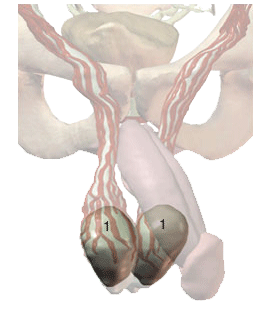Signs &
Symptoms of Testicular Cancer
More than ninety percent of patients present with a painless lump or
mass in the testicle. Patients may also notice a sensation of heaviness
in the scrotum or lower abdominal aching. Scrotal enlargement or
swelling is also common in patients with testicular cancer.
 Some patients
with testicular cancer have no symptoms at all, especially in the early
stage. Their cancer may be found incidentally during routine physical
exams, such as ultra sound test or biopsy for diagnosis of infertility.
Some patients
with testicular cancer have no symptoms at all, especially in the early
stage. Their cancer may be found incidentally during routine physical
exams, such as ultra sound test or biopsy for diagnosis of infertility.
Certain types of testicular cancers, i.e., germ
cell tumors, can secrete high levels of human chorionic gonadotropin
hormone (HCG), which stimulates breast development. One of the uncommon
symptoms for testicular cancer patients is breast tenderness or breast
growth. This symptom results from the abnormal secretion of HCG from
certain types of testicular cancer. Blood tests can measure HCG levels;
these tests are important in diagnosis, staging, and in follow-up of
some testicular cancers.
Two types of testicular tumors, Leydig cell tumors
and Sertoli cell tumors, may produce androgens (male sex hormones) or
estrogens (female sex hormones). Estrogen can cause breast growth in
men and cause decreased libido (loss of sexual desire). Over production
of androgen may or may not cause any specific symptoms in adult males;
however, it can cause growth of facial and body hair at an abnormally
early age.
Even with metastatic disease (when cancer has
spread to other organs), only about 25% of patients may experience
symptoms related to the metastasis before the diagnosis. The most
common place for the disease spread is to the lymph nodes in the
posterior part of the abdomen. Therefore, lower back pain is a frequent
symptom of later-stage testicular cancer. If the cancer has spread to
the lungs, cough, chest pain, and/or shortness of breath can occur.
Hemoptysis (sputum with blood) may also develop.
The above is a summary of symptoms and signs of
testicular cancer. Keep in mind that some of these symptoms may be
caused by other conditions, such as testicle injury or testicle
infection. Inflammation of the testicle, known as orchitis, can cause
painful swelling. Causes of orchitis include viral or bacterial
infections. About 1 man in 5 who contracts mumps as an adult
experiences orchitis in one or both testes. However, it is important to
see a physician if any of these symptoms lasts 10 days or longer. Early
diagnosis of testicular cancer is extremely important.
- A lump or mass in
either testicle
- Any enlargement
or swelling of a testicle
- A collection of
fluid in the scrotum
- A dull ache in
the lower abdomen, back, or in the groin
- A feeling of
heaviness in the scrotum
- Discomfort or
pain in a testicle or in the scrotum
- Enlargement
or tenderness of the breasts
Risk Factors? Who has
the highest risk of developing testicular cancer?
:: Learn More About Diagnosing and Staging
of Testicular Cancer ::
Testicular cancer is rare. Despite a slow increase
in the number of new cases, the number of deaths due to testicular
cancer has decreased dramatically since the 1960s as a result of
treatment improvements. Anything that increases a person's chance of
developing a disease is called a risk factor. Some risk factors for
testicular cancer are as follows: Age - Young men have a higher risk of
testicular cancer. In men, testicular cancer is the most common cancer
between the ages of 20 to 34, the second most common cancer between the
ages of 35 to 39, and the third most common cancer between the ages of
15 to 19. Family History - Men with a family history of testicular
cancer may have an increased risk of developing testicular cancer.
Hereditary Conditions - Men born with gonadal dysgenesis or
Klinefelter's syndrome have a greater risk of developing testicular
cancer. Personal History - Men with undescended testicles have a
higher-than-average risk of developing testicular cancer. Men who have
already had testicular cancer have a higher risk of developing a tumor
in the other testicle. Race - Testicular cancer is more common among
white men than black men. Hispanic, American Indian, and Asian men
develop testicular cancer at a higher rate than black men, but less
than white men.
